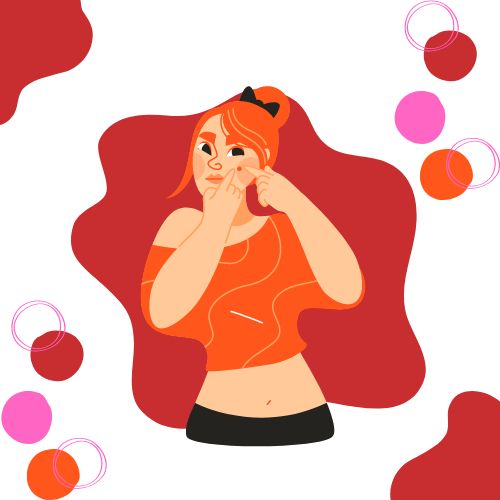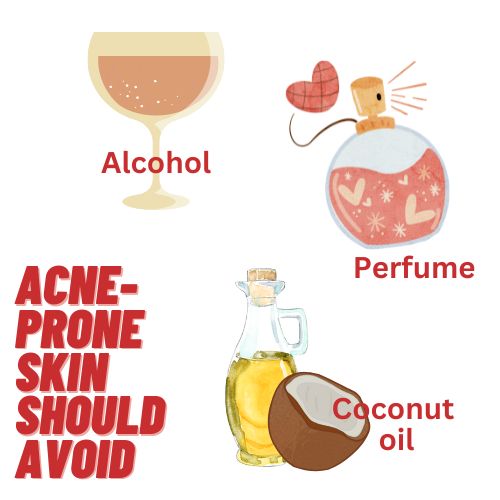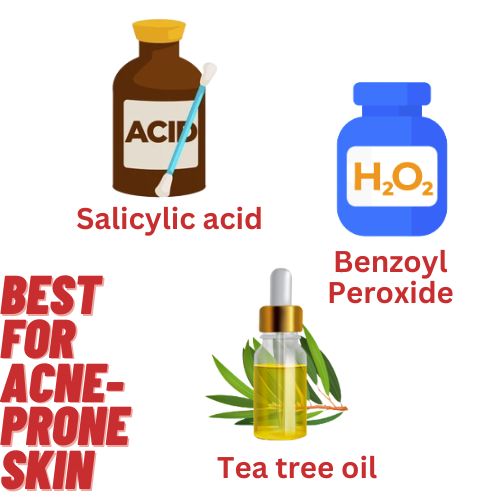Having acne-prone sensitive skin, especially on the face, can be frustrating and self-demeaning. Individuals who suffer from acne often feel ashamed of the breakouts, blackheads, and little bumps. As a result, they compromise by hiding themselves or by refusing to go out with others.
This shouldn’t be so. Everyone should feel happy in their skin. That’s why in this guide, I will walk you through the best products for acne-prone sensitive skin so you can regain your self-confidence, in case you’ve lost it.
Stay with me!
Table of Contents
Best products for treating acne-prone sensitive skin
| Image | Product | Features | Price |
|---|---|---|---|
 | The Ordinary Azelaic Acid Suspension 10% | Check Price | |
 | CeraVe PM Facial Moisturizing Lotion |
| Check Price |
 | CETAPHIL Moisturizing Lotion |
| Check Price |
 | CeraVe Acne Foaming Cream Cleanser |
| Check Price |
 | Neutrogena Oil-Free Acne Fighting Face Wash |
| Check Price |
 | Acne Treatment Differin Gel, 30 Day Supply |
| Check Price |
1. The Ordinary Azelaic Acid Serum

Check Price On Amazon
Blemishes and dark spots can both be improved with the Ordinary Azelaic. It contains 10% azelaic acid to brighten your complexion, is cruelty-free, vegan, and gentle enough to use twice a day.
Moreover, it improves the evenness of skin texture and minimizes the appearance of imperfections.
You can apply it twice daily to your face to improve the appearance of your skin’s brightness and texture. During the day, use sun protection to prevent contact with your eyes and mouth.
Pros
- Smoothes skin.
- Even skin tone.
- Help treat Rosacea
- Contains Azelaic Acid.
- Treats blemishes and dark spots.
- Treats acne-prone sensitive skin.
Cons
- The smell may not be favourable to some.
2. CeraVe PM Facial Moisturizing Lotion

Check Price On Amazon
For acne, hydration and oil-free products, such as CeraVe everyday moisturizer, can be very helpful. The oil-free nighttime moisturizer from the brand provides essential moisture throughout the night with niacinamide, hyaluronic acid, and other ceramides.
As you sleep, CeraVe PM Facial Moisturizer locks in your skin’s moisture and helps restore its natural barrier.
Pros
- Oil-free.
- Lightweight.
- non-comedogenic.
- Contain niacinamide.
- Nourishes your skin’s natural barrier.
Cons
- Not thick as some may want it
3. Cetaphil Moisturizing Lotion

Check Price On Amazon
For those with sensitive skin who suffer from acne, Cetaphil is a trustworthy brand. For sensitive skin types, the brand’s face and body moisturisers have a non-greasy, paraben-free product without any additional fragrance.
Niacinamide, panthenol, and moisturising glycerin were specially blended with the support of dermatologists to increase the resiliency of sensitive skin.
According to Cetaphil, the moisturiser can keep skin hydrated for up to 24 hours.
Pros
- Paraben free
- Hypoallergenic
- Fragrance-Free
- Clinically proven
- Dermatologists tested
- Gentle on sensitive skin.
- Defends against 5 signs of skin sensitivity.
- Contain vitamin B3, vitamin B5, and hydrating glycerin.
Cons
- Thin lotion
4. CeraVe Acne Foaming Cream Cleanser

Check Price On Amazon
CeraVe is an excellent choice for a low-strength benzoyl peroxide wash. It contains 4% benzoyl peroxide to help remove acne, hyaluronic acid to help retain the skin’s natural moisture, and niacinamide to help with natural anti-inflammatory effects.
CeraVe Acne Foaming Cream Cleanser is designed to thoroughly remove grime. The cleanser also contains hyaluronic acid, which helps your face keep its natural hydration, and niacinamide, which provides calming benefits while enabling your skin to heal.
Pros
- Non-comedogenic
- Helps calm the skin.
- Contains benzoyl peroxide.
- Helps clear acne and blackheads.
- Help maintain the skin’s natural barrier
Cons
- Thin lotion
5. Neutrogena Oil-Free Salicylic Acid Acne Wash

Check Price On Amazon
Neutrogena’s oil-free salicylic acid acne cleanser cleans pores and soothes acne. It contains lipo-hydroxy acid, which is a gentler acne treatment. Because it is free of oils, perfumes, and parabens, it is suited for most skin types.
This effective acne treatment and cleanser treats and prevents outbreaks in a single step. The oil-free product not only gently cleanses deep into pores for clear skin but also contains salicylic acid to help clear acne and prevent future breakouts.
Pros
- Oil-free
- Rinses clean
- Non-irritating skin.
- Non-comedogenic
- Dermatologist tested
- Contain Salicylic Acid
- Acne-fighting facial cleanser.
Cons
- Some users prefer fragrance and foam.
6. Differin Adapalene Gel 0.1% Acne Treatment

Check Price On Amazon
This product contains an over-the-counter retinoid. Retinoid promotes skin cell turnover and cures inflammation to deeply clean pores and prevent new pimples from forming. This treatment is recommended for night use only since it does not tolerate UV light or sunshine.
It prevents breakouts, blackheads, whiteheads, blemishes, and congested pores with the power of an Rx without the need for a prescription. This lotion also improves skin tone and texture by removing acne.
Pros
- Restores skin tone.
- Prevents breakouts
- Prevents acne from forming.
- Available in 15g (up to 30-day supply) and 45g (up to a 90-day supply).
Cons
- Takes weeks to see results.
What is acne-prone sensitive skin?

The term sensitive, acne-prone skin refers to skin that is more prone to inflammation and adverse reactions as well as to chemical, dye, and fragrance exposure. Several factors can contribute to this, including genetics, lifestyle, and the environment.
Acne-prone skin is marked by a large number of pimples and deeper inflamed lesions over a large area of the face, back, or neck. There may be redness and inflammation around acne lesions that are raised or deep under the epidermis. It is common for acne-prone skin to be more tender to the touch.
What ingredients should acne-prone sensitive skin avoid?

1. Alcohol
Alcohol is an ingredient in skin care products that remove excess oil from the skin. This makes the overall health of the skin dry and irritating. It is even more irritating to people with sensitive or dry skin.
As a result, it’s convenient to avoid skin care products that contain alcohol.
2. Coconut oil
Although coconut oil contains moisturising triglycerides such as oleic, linoleic, and lauric acid, when applied to acne-prone skin, it can clog pores, trapping debris, sebum, and dead cells inside.
While linoleic acid, an unsaturated oil, may be beneficial to the skin, oleic and lauric acid are to blame for congested skin. Choose products with argan oil as an emollient since it is high in linoleic acid, which decreases inflammation and has antibacterial characteristics to help treat present zits.
3. Perfumes
The fact about skin care products is that the words fragrance or perfume on an ingredient list can sometimes refer to a cocktail of dozens of chemicals, any of which can irritate acne-prone skin. Skin allergies are frequently caused by synthetic scents.
This can result in inflammation and irritation, making acne treatment even more difficult. If you have acne, avoid essential oils and natural smells, as well as synthetic perfumes.
4. Mineral oil
Many ‘natural’ skincare firms may pack their products with large amounts of essential oils, which can be irritating to already inflamed skin.
Essential oils are highly concentrated chemicals that, when applied directly to the skin, can be unpleasant. This is why essential oils should be diluted in a carrier oil before application. However, most carrier oils are high in saturated fats, which can clog your pores. Unsaturated fats, such as omega 3 and 6, are less prone to causing acne.
5. Lanolin
Lanolin is a waxy, oily material extracted from sheep’s wool. Because of its soothing and conditioning characteristics, it is a popular choice for treating dry or cracked skin. It aids in the retention of moisture, making it a common ingredient in moisturisers and lotions.
Nonetheless, lanolin is known to clog pores, causing a cycle of comedonal acne, or flesh-coloured papules. Lanolin has been reported to worsen acne in some circumstances.
Hence, avoid them as much as you can.
6. Isopropyl Myristate
Emollients like isopropyl myristate and isopropyl palmitate aid in building the skin barrier and keeping moisture locked in. It is found in many anti-ageing lotions since it aids in the penetration of other chemicals.
However, if you have sensitive or acne-prone skin, avoid this substance because it has high comedogenic qualities and can cause outbreaks.
Best ingredients for acne-prone sensitive skin

1. Benzoyl Peroxide
Benzoyl peroxide is a widely used acne treatment. It can be found as an over-the-counter or prescription medicine, in the form of a gel, cream, lotion, face wash, and soap.
Benzoyl peroxide works by killing or inhibiting the growth of the bacteria Propionibacterium acnes or P. acnes on the skin, which is what typically causes the inflammation and lesions seen in acne.
It also helps to unclog pores by removing dead skin. A lot of benzoyl peroxide products contain 10% of the ingredient, which is an appropriate percentage for treating acne. Higher concentrations have never been proven to be better for acne.
Doctors often recommend starting with skin care products that have benzoyl peroxide. It’s usually well-tolerated by most people.
People with sensitive skin should avoid using this ingredient. The same with people who have skin issues such as eczema or rosacea.
But one downside of benzoyl peroxide is that it causes bleaching. This can lead to the bleaching of hair and discolouration of fabrics like bed linens and clothes.
2. Salicylic acid
Many over-the-counter and prescription skin care products for acne-prone skin contain salicylic acid. It’s a beta hydroxy acid, which is a chemical exfoliator. It helps shed and remove dead skin, which causes inflammation. Using this helps your pores open and remove excess oil.
Using salicylic acid a couple of times a week can have a drying effect, especially on sensitive skin.
3. Alpha Hydroxy Acids
Alpha hydroxy acids (AHA) treat acne by removing dead skin cells and reducing inflammation. They also improve the appearance of acne scars by stimulating the growth of new skin. Two types of alpha hydroxy acids found in acne products are glycolic acid and lactic acid.
4. Sulfur
Sulfur is often combined with other ingredients like benzoyl peroxide or salicylic acid. It removes dead skin cells that clog your pores. It also helps remove excess oil or sebum that may cause breakouts.
Sulfur traditionally has a rotten egg smell, so you may want to test sulfur products to make sure they don’t smell unpleasant.
5. Adapalene
Adapalene is a topical retinoid used to treat mild to moderate acne and blackheads. Retinoids are Vitamin A-based products that are best known for treating ageing skin.
Adapalene can help prevent new breakouts and unclog pores, and it’s the first over-the-counter retinoid treatment approved for acne. It works to regulate the turnover of cells lining the pores to reduce clogging.
It’s available in different forms and strengths. A 0.1% gel can be found as an over-the-counter treatment. You can get a prescription for a 0.1% lotion, cream, or 0.3% gel.
6. Azelaic acid
A naturally occurring compound, azelaic acid, has antibacterial and anti-inflammatory properties. It also helps prevent the buildup of keratin, a protein that can clog pores.
Much like salicylic acid and adapalene, azelaic acid works to unclog pores. It’s milder compared to salicylic acid and adapalene, so it may be a more suitable option if you have sensitive skin.
It can also lighten the brown spots that are left behind by old acne marks, which we see most often in people who have darker skin tones.
7. Vitamin C
Vitamin C is an antioxidant and has anti-inflammatory properties. It is officially known as ascorbic acid. It can help decrease redness and swelling in acne-prone skin.
8. Tea tree oil
This is an essential oil made from the leaves of the tea tree. A gel with 5% tea tree oil may be as effective on acne as one containing 5% benzoyl peroxide. However, tea tree oil may not work as fast as other ingredients.
What to know when buying products for acne-prone sensitive skin
1. Look for non-comedogenic products.
When shopping for acne-prone skin care products, dermatologists advise looking for a non-comedogenic label, which means the ingredients or product will not clog your pores.
2. Be gentle on your skin.
When using any type of product, always be gentle when washing your face and applying products. Avoid scrub washes and mechanical scrubbing routines that may cause more irritation that can worsen acne.
3. Apply Sunscreen.
When using any type of acne-fighting product, follow up with a non-comedogenic moisturiser and sunscreen in the morning. Sunscreen helps prevent dark spots after breakouts and helps fade pigmentation. Dermatologists recommend using a mineral sunscreen with SPF 30 or higher during the day.
How to treat acne-prone sensitive skin
- Cleanse
- Use a non-comedogenic moisturiser.
- Apply topical retinoids to
- Use clean make-up products.
Now it’s your turn.
Acne-prone sensitive skin can be treated with the right dermatologist’s tested products. These products reviewed are the best to solve your age-long acne issues. Within a few weeks, you should be reporting satisfactory results and saying goodbye to acne.
You also need to take into account your eating habits as they affect acne formation. Don’t forget to hydrate or drink at least two litres of water daily.
Related Articles:


